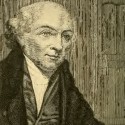Category: Theology
-

Butler’s Analogy
Joseph Butler (born this day, May 18, 1692; died in 1752) was the Bishop of Durham and a celebrated public intellectual. In fact, his greatest work, the Analogy of Religion (1736) was so famous in its own time and so influential for the next 150 years, that it is hard to explain how it could…
-

The Departure of G. Campbell Morgan
George Campbell Morgan (born 1863, died this day, May 16,1945) was an internationally renowned Bible teacher with an extensive ministry based at London’s Metropolitan Chapel. For about two years (from early 1927 to December 1928) he taught at BIOLA. Always a popular teacher, Morgan was well-liked at this young Bible Institute (just entering its third…
-
Why Protestants Should Read Thomas Aquinas (4: Big Thoughts)
The fourth and final benefit of reading Thomas Aquinas (see the first, second, and third in previous posts) is that Thomas is a master of thinking big thoughts. There are only a handful of theologians in the history of the church who can think so big and teach you to do likewise. So while Thomas…
-
Famous Last Words (for Biola’s Class of 2009)
(delivered at the Senior Dinner for Biola’s graduating class, May 15, 2009) Thank you so much for how you have honored me by inviting me to this special dinner and electing me Professor of the Year. It means a lot to me that out of all the great professors you have had in your years…
-

Gustaf Aulén, Lundensian Theologian
Gustaf Aulén (born this day, May 15, 1879; died 1977) was the Lutheran bishop of Strängnäs, Sweden, and the leading figure in a loosely-defined movement within twentieth-century theology called the Lundensian Theology. The other major figures in the movement were Anders Nygren, Ragnar Bring, and, at a distance, Regin Prenter. The label Lundensian, which is…
-
Why Protestants Should Read Thomas Aquinas (3: Skill in Reasoning)
Here is the third benefit of studying Thomas Aquinas (see also benefits one and two): He can help you become skillful in reasoning. No matter what you read by him, and no matter where you start reading, as long as you reel off a few pages and pay attention to them, you will see a…
-

Timothy Dwight of Yale
Timothy Dwight (born this day, May 14, 1752; died in 1817) became the President of Yale at a time in American higher education when skepticism was becoming cool, and all the young men of the nation who had spent a few months on a college campus expected each other to be outgrowing the colonial faith…
-
Why Protestants Should Read Thomas Aquinas (2: Faith and Reason)
A second benefit of reading Thomas Aquinas (see my previous post for the first benefit) is that Thomas Aquinas knew how to use both faith and reason. Thinking Christians need to know how to do this. When people first read Thomas, some people consider him a rationalist (he can prove God’s existence using pure reason!),…
-

The Pirates of Praise-ance?
His name has to be paired with Gilbert before most people will recognize him, because he is best known as the composer of the music for those Gilbert and Sullivan comic operas like Mikado, H. M. S. Pinafore, and Pirates of Penzance. But Sir Arthur Seymour Sullivan (born this day, May 13, 1842; died 1900)…
-
Why Protestants Should Read Thomas Aquinas (1: The Myth of the Dark Ages)
This week I spoke for Saint Augustine Classical Academy’s Spring Speaker series on the topic, “Why Protestants Should Read Thomas Aquinas,” with the alternate title, “The Myth of the Dark Ages.” I shared with the parents and administrators there that there are four benefits for evangelical Protestants reading Aquinas. Here is the first benefit. 1.…
-

Carey’s Enquiry, May 12, 1792
It had one of those classic self-expositing eighteenth-century titles: “An Enquiry into the Obligations of Christians to Use Means for the Conversion of the Heathens,” and tacked onto that was an even more elaborate sub-title: “in which the Religious State of the Different Nations of the World, the Success of Former Undertakings, and the Practicability…
-
Want Your Carnal Nature Removed? Too Bad
“What is meant by those who say that after their conversion they had an up and down experience, and then came a second time and that they had the carnal nature, inbred sin or sin principle taken out?” Doubtless what they mean is that when they first accepted Christ, they did not fully surrender to…